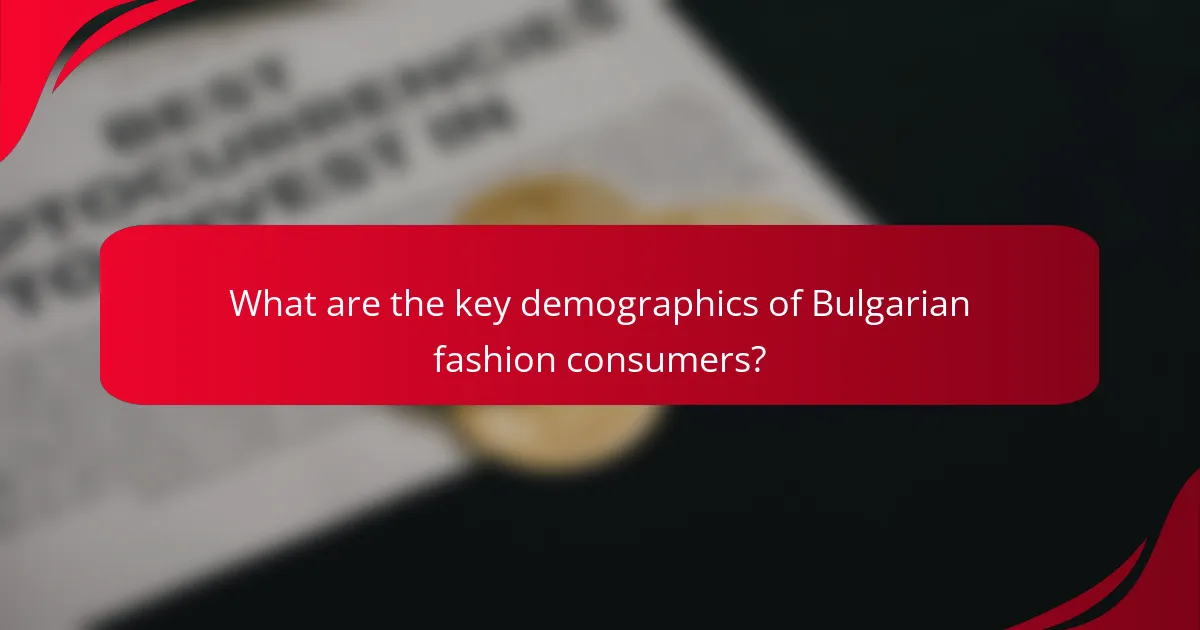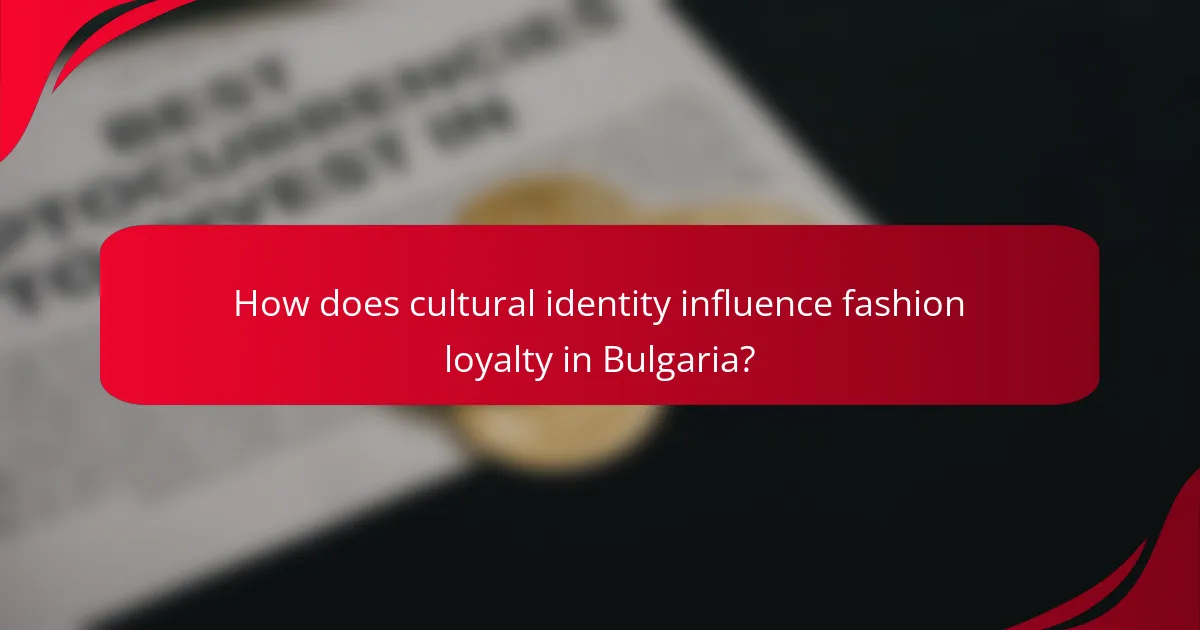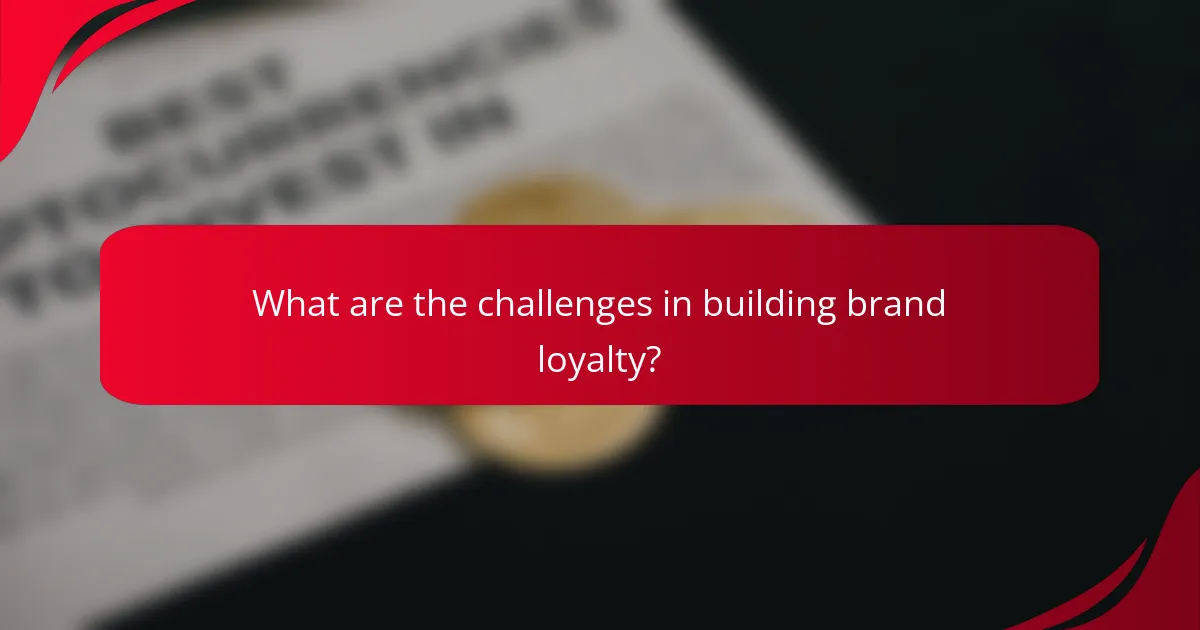Building brand loyalty among Bulgarian fashion consumers requires a strategic approach that emphasizes personalized experiences and effective communication. By leveraging local insights and crafting compelling brand narratives, companies can create meaningful connections that resonate emotionally with their audience. This not only enhances consumer engagement but also encourages repeat purchases, ultimately fostering a loyal customer base.

How can Bulgarian fashion brands build customer loyalty?
Bulgarian fashion brands can build customer loyalty by creating meaningful connections with their consumers through targeted strategies. Focusing on personalized experiences, effective communication, and exclusive offerings will enhance brand affinity and encourage repeat purchases.
Implementing loyalty programs
Loyalty programs are effective tools for fostering customer loyalty among Bulgarian fashion consumers. These programs can include point systems, discounts, or exclusive member benefits that reward repeat purchases. Brands should consider offering tiered rewards to incentivize higher spending and engagement.
For example, a brand could offer 1 point for every BGN 10 spent, with rewards such as discounts or early access to sales once customers reach certain point thresholds. This encourages ongoing patronage and increases customer retention.
Enhancing customer experience
Enhancing the customer experience is crucial for building loyalty. This involves ensuring that every interaction, from browsing to purchasing, is seamless and enjoyable. Brands should focus on user-friendly websites, responsive customer service, and easy return policies to create a positive shopping environment.
Additionally, in-store experiences can be improved through knowledgeable staff and engaging displays that resonate with local culture. Offering personalized shopping assistance can also elevate the overall experience.
Utilizing social media engagement
Social media engagement is a powerful way for Bulgarian fashion brands to connect with consumers. Brands should actively participate on platforms like Instagram and Facebook, sharing content that resonates with their audience, such as styling tips, behind-the-scenes looks, and user-generated content.
Regular interaction through comments, polls, and live sessions can foster a sense of community and make customers feel valued. Brands might also consider collaborations with local influencers to reach a wider audience and build credibility.
Offering personalized recommendations
Personalized recommendations can significantly enhance customer loyalty by making consumers feel understood and valued. Brands can utilize data analytics to track customer preferences and purchase history, allowing them to suggest items that align with individual tastes.
For instance, sending tailored emails with product suggestions based on previous purchases can encourage repeat visits and purchases. Implementing AI-driven chatbots on websites can also provide instant personalized assistance to shoppers.
Creating exclusive collections
Creating exclusive collections can attract loyal customers who seek unique fashion items. Limited-edition releases or collaborations with local artists can generate excitement and urgency, encouraging consumers to make purchases before items sell out.
Brands should promote these exclusive offerings through targeted marketing campaigns, highlighting the uniqueness and craftsmanship involved. This strategy not only drives sales but also reinforces the brand’s identity and connection with its customer base.

What role does brand storytelling play in loyalty?
Brand storytelling is crucial for fostering loyalty among consumers, as it creates a narrative that resonates emotionally and builds a connection. By effectively communicating a brand’s story, companies can enhance consumer engagement and encourage repeat purchases.
Connecting emotionally with consumers
Emotional connections are key to brand loyalty. When a brand shares authentic stories that reflect its values and mission, consumers are more likely to feel a personal attachment. For instance, a Bulgarian fashion brand that highlights its journey and struggles can resonate deeply with local shoppers.
Utilizing relatable narratives, such as customer testimonials or behind-the-scenes glimpses, can enhance this emotional bond. Brands should aim to evoke feelings of nostalgia, pride, or aspiration to strengthen loyalty.
Showcasing brand values
Demonstrating core values through storytelling can significantly impact consumer loyalty. Bulgarian fashion brands should clearly articulate their commitment to sustainability, ethical practices, or community support. This transparency helps consumers align their purchasing decisions with their personal beliefs.
For example, a brand that emphasizes eco-friendly materials and fair labor practices can attract consumers who prioritize sustainability. Regularly sharing updates on these initiatives can reinforce the brand’s dedication to its values.
Highlighting local craftsmanship
Emphasizing local craftsmanship in brand storytelling can enhance consumer loyalty by fostering a sense of community. Bulgarian consumers often appreciate products that showcase local artisanship and cultural heritage, making it essential for brands to highlight these aspects.
Brands can share stories about the artisans who create their products, detailing the techniques and traditions involved. This not only supports local economies but also appeals to consumers’ desire for authenticity and quality in their fashion choices.

Which marketing strategies are effective in Bulgaria?
Effective marketing strategies in Bulgaria focus on building trust and engagement with consumers. Brands that leverage local insights and cultural nuances tend to foster stronger loyalty among Bulgarian fashion consumers.
Influencer partnerships
Influencer partnerships can significantly enhance brand visibility and credibility in Bulgaria. Collaborating with local influencers who resonate with target audiences allows brands to tap into established trust and relatability.
When selecting influencers, consider their engagement rates and alignment with your brand values. Micro-influencers, who often have smaller but highly engaged followings, can be particularly effective in niche markets.
Content marketing campaigns
Content marketing campaigns that tell compelling stories or provide valuable insights are crucial for engaging Bulgarian consumers. High-quality visuals and relatable narratives can create a strong emotional connection with the audience.
Utilize platforms like Instagram and Facebook, which are popular in Bulgaria, to share content that highlights your brand’s unique offerings. Regularly updating content and incorporating user-generated content can further enhance engagement.
Targeted display advertising
Targeted display advertising allows brands to reach specific demographics effectively in Bulgaria. By using data analytics, brands can tailor ads based on consumer behavior, preferences, and location.
Consider using platforms like Google Ads or local networks to implement retargeting strategies. This approach can help maintain brand visibility and encourage repeat visits, ultimately driving conversions.

What are the key demographics of Bulgarian fashion consumers?
Bulgarian fashion consumers are diverse, with varying preferences influenced by age, income, and location. Understanding these demographics is crucial for brands aiming to build loyalty among this audience.
Age group preferences
Age significantly impacts fashion preferences among Bulgarian consumers. Younger shoppers, particularly those in their teens and twenties, tend to favor trendy, fast-fashion items, often influenced by social media and global trends. In contrast, consumers in their thirties and forties may prioritize quality and sustainability, opting for brands that offer timeless pieces.
Older consumers, typically over fifty, often seek comfort and practicality in their clothing choices. Brands should tailor their marketing strategies to resonate with each age group’s distinct values and preferences.
Income level insights
Income levels play a critical role in shaping fashion consumption patterns in Bulgaria. Higher-income consumers are more likely to invest in luxury brands and designer items, valuing exclusivity and craftsmanship. In contrast, middle-income shoppers often look for a balance between quality and affordability, frequently opting for mid-range brands.
Lower-income consumers typically prioritize budget-friendly options, seeking sales and discounts. Brands should consider offering a range of products at various price points to cater to these different income segments effectively.
Urban vs. rural consumer behavior
Urban consumers in Bulgaria generally exhibit more progressive fashion trends, influenced by international styles and access to a wider variety of brands. They are more likely to shop online and engage with fashion through social media platforms.
Rural consumers, however, tend to favor practicality and durability in their clothing choices. They may prioritize local brands and traditional styles, reflecting their lifestyle needs. Brands should adapt their marketing strategies to address these differences, ensuring they resonate with both urban and rural audiences.

How does cultural identity influence fashion loyalty in Bulgaria?
Cultural identity significantly shapes fashion loyalty among Bulgarian consumers by fostering a connection to local heritage and values. This influence manifests in preferences for brands that reflect traditional elements while also appealing to contemporary tastes.
Embracing local traditions
Bulgarian consumers often show loyalty to brands that incorporate local traditions into their designs. This can include the use of traditional motifs, fabrics, and craftsmanship that resonate with national pride. Brands that celebrate Bulgarian folklore or collaborate with local artisans tend to attract a dedicated customer base.
For instance, fashion lines that feature traditional embroidery or patterns inspired by Bulgarian folklore can enhance brand loyalty. Consumers appreciate the authenticity and cultural significance, which often translates into a willingness to pay a premium for such products.
Adapting to modern trends
While local traditions are important, Bulgarian consumers also seek brands that adapt to modern fashion trends. This balance between tradition and contemporary style is crucial for maintaining relevance in a competitive market. Brands that successfully merge classic elements with current fashion can appeal to a broader audience.
For example, a brand that offers contemporary silhouettes while incorporating traditional Bulgarian colors or patterns can attract younger consumers who value both heritage and modernity. Staying updated with global fashion trends while respecting local culture is key to building lasting loyalty among Bulgarian fashion shoppers.

What are the challenges in building brand loyalty?
Building brand loyalty among Bulgarian fashion consumers involves several challenges, including intense competition, changing consumer preferences, and the need for effective communication. Brands must navigate these obstacles to cultivate lasting relationships with their customers.
Understanding consumer preferences
Consumer preferences in Bulgaria are influenced by various factors such as cultural trends, economic conditions, and social media. Brands must stay attuned to these dynamics to align their offerings with what consumers desire. Regular market research can help identify shifts in taste and emerging trends.
Competition in the fashion market
The Bulgarian fashion market is saturated with both local and international brands, making it crucial for companies to differentiate themselves. Unique selling propositions, such as sustainable practices or exclusive designs, can help attract and retain customers. Brands should also monitor competitors to adapt their strategies accordingly.
Effective communication strategies
Clear and engaging communication is vital for building brand loyalty. Brands should utilize various channels, including social media, email marketing, and in-store experiences, to connect with their audience. Tailoring messages to resonate with local culture and values can enhance engagement and foster loyalty.
Building trust and credibility
Trust is a cornerstone of brand loyalty. Bulgarian consumers are likely to remain loyal to brands that demonstrate transparency, quality, and reliability. Providing consistent product quality and excellent customer service can significantly enhance a brand’s credibility.
Leveraging social media
Social media plays a crucial role in shaping brand perceptions among Bulgarian consumers. Brands should actively engage with their audience on platforms like Instagram and Facebook, showcasing their products and values. User-generated content and influencer partnerships can amplify reach and strengthen community ties.










